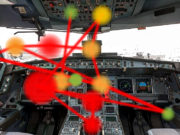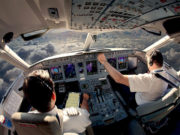Developed by Active Pilot Monitoring Working Group
Abu Dhabi, UAE – Flight Safety Foundation announced today the release and publication of A Practical Guide for Improving Flight Path Monitoring, the final report of the Active Pilot Monitoring Working Group (WG). The WG was created to address the issue of aviation incidents with ineffective monitoring as a factor.
The study was released during FSF’s 67th annual International Air Safety Summit with a presentation by Helena Reidemar, of Air Line Pilots Association, International and co-chair of the Working Group.
According to Robert Sumwalt of the US National Transportation Safety Board: “Aircraft accidents, incident data, and research all point to the same thing: when pilots don’t properly monitor the aircraft flight path, safety margins decrease. In the past two decades, for example, the NTSB investigated 14 major accidents where poor monitoring was a factor, and these accidents claimed nearly 350 lives. Like most things in flying, monitoring is a skill that can be taught, and with training, performance can improve. The recommendations outlined in this document, if implemented, will improve pilot monitoring.”
This study is intended to provide guidance to improve flight path monitoring by offering useful and realistic changes that would have a positive impact on aviation safety. This effort resulted in 20 recommendations organized into the following categories:
- Monitoring practices
- Procedures, policies and monitoring
- Monitoring autoflight systems
- Training and evaluating monitoring systems
“All throughout IASS 2014, we’ve been hearing about issues that could be directly mitigated by the recommendations in this report,” stated FSF President and CEO, Jon L. Beatty. “By publishing this report, we can ensure that it reaches the widest possible international audience with its important recommendations.”
The final study is available on the FSF website at www.flightsafety.org/flightpath
Flight Safety Foundation (www.flightsafety.org) is an independent, non-profit, international organization engaged in research, education, advocacy and publishing to improve aviation safety. The Foundation’s mission is to be the leading voice of safety for the global aerospace community.
Contact: Emily McGee, +1 703 739 6700, ext. 126; mcgee@flightsafety.org


